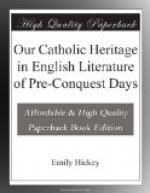We begin with the work of poets. Out of all those who wrote in what was the best period of our old poetry, a period that lasted some hundred and fifty or seventy-five years, we know the names of two only, Caedmon and Cynewulf.
And here may I say that scholars agree that the names are to be pronounced Kadmon and Kun-e-wolf; in the second name we sound the y like a French u, make a syllable of the e, not sounding it as ee, but short, and make the last syllable just what we now pronounce as wolf.
Both of these poets deserve our love and our praise, as singers and inspirers of other singers, but we know much more about Caedmon’s life than we know about his share in the poetry that has been attributed to him; that is the poetry which has gone under his name. That he did write much fine verse we know. On the other hand, we know a good deal as to the authenticity of Cynewulf’s poetry, and nothing about his life.
Both of these poets wrote in the language spoken in England before the period of French influence. That influence upon English at first seemed to be disastrous; the language became broken up and spoilt: but this was only for a time; and by and by, out of roughness and chaotic grammar there grew up a beautiful and stately speech meet for great poets to sing in, and great men and women to use. So it is that what for a time seems to be disastrous may one day be realised as benign and beautiful.
This pre-Conquest language has to be learned as we learn a foreign tongue. It is much easier to learn than Latin or German, but still it has to be learned; so we shall have to listen to the thought of these poets in the language of our own day, allowing ourselves now and then the use of words or expressions which it is fair to employ in rendering old poetry or prose, though we do not use them in ordinary speech or writing.
We shall sometimes use translations, and sometimes I will tell you about the poetry, giving the gist of it as best I can.
[Illustration: WHITBY ABBEY]




